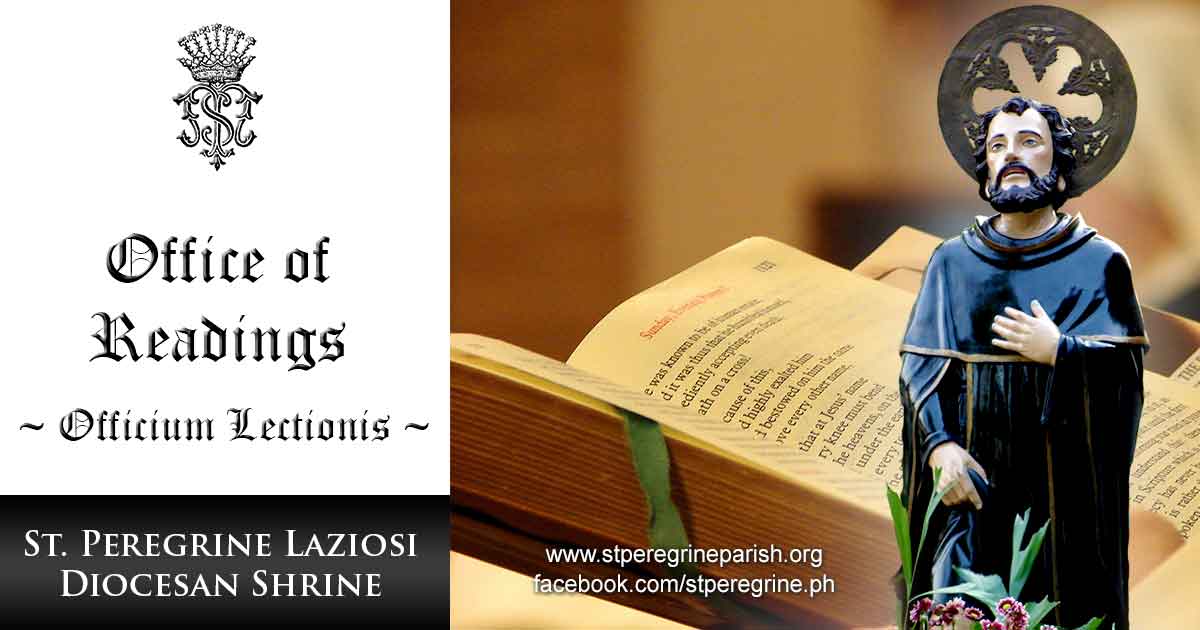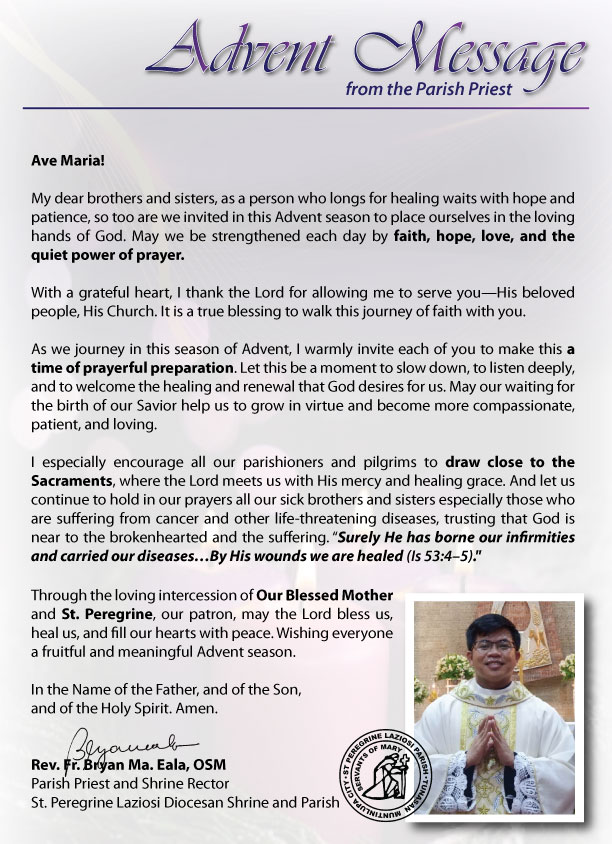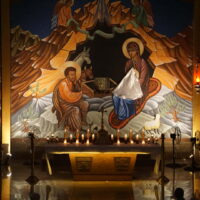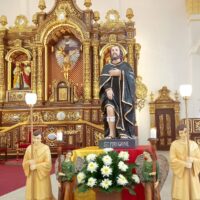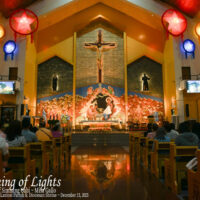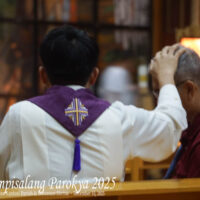Ribbon Placement:
Liturgy of the Hours Vol. II:
Ordinary: 1045
Proper of Seasons: 381
Psalter: Friday, Week I, 1176
Office of Readings for Friday of the 5th week of Lent
God, come to my assistance.
— Lord, make haste to help me.
Glory to the Father, and to the Son, and to the Holy Spirit:
— as it was in the beginning, is now, and will be for ever. Amen.
HYMN
1 The Lord is my shepherd; I shall not want.
2 He maketh me to lie down in green pastures: he leadeth me by the still waters.
3 He restoreth my soul: he leadeth me in the paths of righteousness for his name’s sake.
4 Yea, though I walk through the valley of the shadow of death, I will fear no evil: for thou art with me; thy rod and thy staff they comfort me.
5 Thou preparest a table for me in the presence of my enemies: thou anointest my head with oil; my cup runneth over.
6 Surely goodness and mercy shall follow me all the days of my life: and I will dwell in the house of my Lord for ever.
| 𝄞 | “Psalm 23” by Melinda Kirigin-Voss • • Available on iTunes • Text from Psalm 23 King James Version; Used wih permission • Albums that contain this Hymn: Yesterday, Today, and Forever |
PSALMODY
Ant. 1 Rise up, Lord, and come to my aid.
Psalm 35: 1-2, 3c, 9-19, 22-23, 27-28
The Lord as Savior in time of persecution
They came together… and laid their plans to capture Jesus by treachery and put him to death (Matthew 26:3-4).
I
O Lord, plead my cause against my foes;
fight those who fight me.
Take up your buckler and shield;
arise to help me.
O Lord, say to my soul:
“I am your salvation.”
But my soul shall be joyful in the Lord
and rejoice in his salvation.
My whole being will say:
“Lord, who is like you
who rescue the weak from the strong
and the poor from the oppressor?”
Lying witnesses arise
and accuse me unjustly.
They repay me evil for good:
my soul is forlorn.
Glory to the Father, and to the Son, and to the Holy Spirit:
— as it was in the beginning, is now, and will be for ever. Amen.
Ant. Rise up, Lord, and come to my aid.
Ant. 2 All-powerful Lord, stand by me and defend me.
II
When they were sick I went into mourning,
afflicted with fasting.
My prayer was ever on my lips,
as for a brother, a friend.
I went as though mourning a mother,
bowed down with grief.
Now that I am in trouble they gather,
they gather and mock me.
They take me by surprise and strike me
and tear me to pieces.
They provoke me with mockery on mockery
and gnash their teeth.
Glory to the Father, and to the Son, and to the Holy Spirit:
— as it was in the beginning, is now, and will be for ever. Amen.
Ant. All-powerful Lord, stand by me and defend me.
Ant. 3 My tongue will speak of your goodness all the day long.
III
O Lord, how long will you look on?
Come to my rescue!
Save my life from these raging beasts,
my soul from these lions.
I will thank you in the great assembly,
amid the throng I will praise you.
Do not let my lying foes
rejoice over me.
Do not let those who hate me unjustly
wink eyes at each other.
O Lord, you have seen, do not be silent,
do not stand afar off!
Awake, stir to my defense,
to my cause, O God!
Let there be joy for those who love my cause.
Let them say without end:
“Great is the Lord who delights
in the peace of his servant.”
Then my tongue shall speak of your justice,
all day long of your praise.
Glory to the Father, and to the Son, and to the Holy Spirit:
— as it was in the beginning, is now, and will be for ever. Amen.
Psalm-prayer
Lord, you rescue the poor from their oppressors, and you rose to the aid of your beloved Son against those who unjustly sought his life. Look on your Church as we journey to you, that the poor and weak may recognize the help you provide and proclaim your saving acts.
Ant. My tongue will speak of your goodness all the day long.
Sacred Silence (indicated by a bell) – a moment to reflect and receive in our hearts the full resonance of the voice of the Holy Spirit and to unite our personal prayer more closely with the word of God and public voice of the Church.
Turn back to the Lord your God.
— He is kind and merciful.
READINGS
First reading
From the letter to the Hebrews
7:11-28
The eternal priesthood of Christ
If perfection had been achieved through the levitical priesthood (on the basis of which the people received the law), what need would there have been to appoint a priest according to the order of Melchizedek, instead of choosing a priest according to the order of Aaron?
When there is a change of priesthood, there is necessarily a change of law. Now he of whom these things are said was of a different tribe, none of whose members ever officiated at the altar. It is clear that our Lord rose from the tribe of Judah, regarding which Moses said nothing about priests.
The matter is clearer still if another priest is appointed according to the likeness of Melchizedek: one who has become a priest, not in virtue of a law expressed in a commandment concerning physical descent, but in virtue of the power of a life which cannot be destroyed. Scripture testifies: “You are a priest forever according to the order of Melchizedek.”
The former commandment has been annulled because of its weakness and uselessness, for the law brought nothing to perfection. But a better hope has supervened, and through it we draw near to God.
This has been confirmed by an oath. The priests of the old covenant became priests without an oath, unlike Jesus to whom God said:
“The Lord has sworn, and he will not repent:
‘You are a priest forever, according to the order of Melchizedek.’”
Thus has Jesus become the guarantee of a better covenant.
Under the old covenant there were many priests because they were prevented by death from remaining in office; but Jesus, because he remains forever, has a priesthood which does not pass away. Therefore he is always able to save those who approach God through him, since he forever lives to make intercession for them.
It was fitting that we should have such a high priest: holy, innocent, undefiled, separated from sinners, higher than the heavens. Unlike the other high priests, he has no need to offer sacrifice day after day, first for his own sins and then for those of the people; he did that once for all when he offered himself. For the law sets up as high priests men who are weak, but the word of the oath which came after the law appoints as priest the Son, made perfect forever.
RESPONSORY Hebrews 5:5, 6; 7:20, 21
Christ did not take upon himself the honor of becoming high priest; he received it from the One who said to him:
— You are a priest for ever, a priest like Melchizedek of old.
No oath was taken when others were made priests, but the priesthood of Jesus was confirmed by the oath of God, who said to him:
— You are a priest for ever, a priest like Melchizedek of old.
Second reading
From a treatise on faith addressed to Peter by Saint Fulgentius of Ruspe, bishop
Christ offered himself for us
The sacrifices of animal victims which our forefathers were commanded to offer to God by the holy Trinity itself, the one God of the old and the new testaments, foreshadowed the most acceptable gift of all. This was the offering which in his compassion the only Son of God would make of himself in his human nature for our sake.
The Apostle teaches that Christ offered himself for us to God as a fragrant offering and sacrifice. He is the true God and the true high priest who for our sake entered once for all into the holy of holies, taking with him not the blood of bulls and goats but his own blood. This was foreshadowed by the high priest of old when each year he took blood and entered the holy of holies.
Christ is therefore the one who in himself alone embodied all that he knew to be necessary to achieve our redemption. He is at once priest and sacrifice, God and temple. He is the priest through whom we have been reconciled, the sacrifice by which we have been reconciled, the temple in which we have been reconciled, the God with whom we have been reconciled. He alone is priest, sacrifice and temple because he is all these things as God in the form of a servant; but he is not alone as God, for he is this with the Father and the Holy Spirit in the form of God.
Hold fast to this and never doubt it: the only-begotten Son, God the Word, becoming man offered himself for us to God as a fragrant offering and sacrifice. In the time of the old testament, patriarchs, prophets and priests sacrificed animals in his honor, and in honor of the Father and the Holy Spirit as well. Now in the time of the new testament the holy catholic Church throughout the world never ceases to offer the sacrifice of bread and wine, in faith and love, to him and to the Father and the Holy Spirit, with whom he shares one godhead.
Those animal sacrifices foreshadowed the flesh of Christ which he would offer for our sins, though himself without sin, and the blood which he would pour out for the forgiveness of our sins. In this sacrifice there is thanksgiving for, and commemoration of, the flesh of Christ that he offered for us, and the blood that the same God poured out for us. On this Saint Paul says in the Acts of the Apostles: Keep watch over yourselves and over the whole flock, in which the Holy Spirit has appointed you as bishops to rule the Church of God, which he won for himself by his blood.
Those sacrifices of old pointed in sign to what was to be given to us. In this sacrifice we see plainly what has already been given to us. Those sacrifices foretold the death of the Son of God for sinners. In this sacrifice he is proclaimed as already slain for sinners, as the Apostle testifies: Christ died for the wicked at a time when we were still powerless, and when we were enemies we were reconciled with God through the death of his Son.
RESPONSORY Colossians 1:21-22; Romans 3:25
Once you were estranged from God, at enmity with him in heart and mind, and your deeds were evil. But now, by Christ’s death in his mortal body,
— God has reconciled you to himself, in order to welcome you into his presence as saints, without the slightest impurity or imperfection.
God made Christ’s sacrificial death the means of expiating the sins of all believers.
— God has reconciled you to himself, in order to welcome you into his presence as saints, without the slightest impurity or imperfection.
CONCLUDING PRAYER
Pardon
the offenses of your peoples,
we pray, O Lord,
and in your goodness
set us free from the bonds of the sins
we have committed in our weakness.
Through our Lord Jesus Christ, your Son,
who lives and reigns with you in the unity of the Holy Spirit,
God, for ever and ever.
— Amen.
ACCLAMATION (at least in the communal celebration)
Let us praise the Lord.
— And give him thanks.
The English translation of The Liturgy of the Hours (Four Volumes) ©1974,
International Commission on English in the Liturgy
Corporation. Readings and Old and New Testament Canticles (except the Gospel Canticles) are from the New American Bible
© 1970 Confraternity of Christian Doctrine, Washington, D.C.. Used with permission. All rights reserved.
The DivineOffice.org website, podcast, apps and all related media follows the liturgical calendar for the United States.
The 1970 edition of the New American Bible as published in the Liturgy of the Hours is approved for use
only in the United States. DivineOffice.org website, podcast, apps and all related media is © 2006-2021
Surgeworks, Inc. All rights reserved.
 Diocese of Parañaque
Diocese of Parañaque

